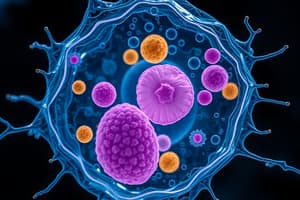Podcast
Questions and Answers
What is the most significant implication of the cell theory regarding the origin of life?
What is the most significant implication of the cell theory regarding the origin of life?
- The first cell likely originated from inorganic molecules through a series of complex reactions.
- Viruses, as non-cellular entities, represent an earlier form of life than cells.
- All cells arise from pre-existing cells, suggesting a continuous lineage of life. (correct)
- Cells can spontaneously generate under the right environmental conditions.
Which statement accurately contrasts prokaryotic and eukaryotic cells?
Which statement accurately contrasts prokaryotic and eukaryotic cells?
- Eukaryotic cells possess a membrane-bound nucleus and organelles, while prokaryotic cells lack these structures. (correct)
- Eukaryotic cells divide by binary fission, whereas prokaryotic cells undergo mitosis or meiosis.
- Prokaryotic cells are typically larger and more complex in structure than eukaryotic cells.
- Prokaryotic cells contain linear DNA organized into chromosomes, while eukaryotic cells have circular DNA.
Which of the following is a primary function of the plasma membrane?
Which of the following is a primary function of the plasma membrane?
- To synthesize proteins and other cellular components.
- To provide a rigid structural support for the cell.
- To store genetic information and control cellular activities.
- To regulate the movement of substances into and out of the cell. (correct)
What is the significance of the synthesis of complex organic molecules from inorganic substances in the context of cell origin?
What is the significance of the synthesis of complex organic molecules from inorganic substances in the context of cell origin?
What role do vesicles play in cellular transport and how does this relate to the endomembrane system?
What role do vesicles play in cellular transport and how does this relate to the endomembrane system?
Which cellular process is most directly involved in the increase of genetic variation in a population?
Which cellular process is most directly involved in the increase of genetic variation in a population?
How does the cell cycle ensure that newly formed cells are genetically identical to the parent cell (in the absence of mutations)?
How does the cell cycle ensure that newly formed cells are genetically identical to the parent cell (in the absence of mutations)?
In what way do membrane proteins contribute to the selective permeability of the cell membrane?
In what way do membrane proteins contribute to the selective permeability of the cell membrane?
What is the role of cholesterol within the cell membrane?
What is the role of cholesterol within the cell membrane?
If a cell is placed in a hypertonic solution, what will occur?
If a cell is placed in a hypertonic solution, what will occur?
Flashcards
Cell Biology
Cell Biology
The first level of cell structure, cells can only be viewed using powerful microscopes.
Prokaryotic cells
Prokaryotic cells
Cells without a nucleus or other membrane-bound organelles.
Eukaryotic cells
Eukaryotic cells
Cells that contain a nucleus and other membrane-bound organelles.
Mitochondria
Mitochondria
Signup and view all the flashcards
Eukaryote
Eukaryote
Signup and view all the flashcards
Study Notes
- The webpage provides resources for studying Cell Biology under the International Baccalaureate (IB) Standard Level curriculum.
- The site is authored by Brent Cornell.
Standard Level Topics in Cell Biology
- 1.1 Introduction to Cells
- 1.2 Ultrastructure of Cells
- 1.3 Membrane Structure
- 1.4 Membrane Transport
- 1.5 The Origin of Cells
- 1.6 Cell Division
Other Standard Level Topics
- Topic 2: Molecular Biology, including metabolic molecules, water, carbohydrates and lipids, proteins, enzymes, DNA/RNA structure, DNA to protein processes, cell respiration, and photosynthesis
- Topic 3: Genetics, covering genes, chromosomes, meiosis, inheritance, and genetic modification
- Topic 4: Ecology, including species and ecosystems, energy flow, carbon cycling, and climate change
- Topic 5: Evolution and Biodiversity, covering evolution evidence, natural selection, classification, and cladistics
- Topic 6: Human Physiology, including digestion, the blood system, disease defenses, gas exchange, neurons and synapses, and homeostasis
Higher Level Topics
- Topic 7: Nucleic Acids, including DNA structure, replication, transcription, and translation
- Topic 8: Metabolism, Cell Respiration & Photosynthesis, covering metabolism, cell respiration, and photosynthesis in depth
- Topic 9: Plant Biology, including xylem and phloem transport, plant growth, and reproduction
- Topic 10: Genetics and Evolution, covering meiosis, inheritance, and speciation
- Topic 11: Animal Physiology, including antibody production, movement, kidney function, osmoregulation, and sexual reproduction
Options
- Option A: Neurobiology, including neural development, the human brain, perception, behavior, pharmacology & ethology
- Option B: Biotechnology, including microbiology, agriculture, environment, medicine & bioinformatics
- Option C: Ecology, including Communities, Ecosystems, Human Impacts, Conservation, Population Ecology & the Nitrogen Cycle
- Option D: Human Physiology, including nutrition, digestion, liver functions, the heart, hormones, metabolism & gas transport
Studying That Suits You
Use AI to generate personalized quizzes and flashcards to suit your learning preferences.




